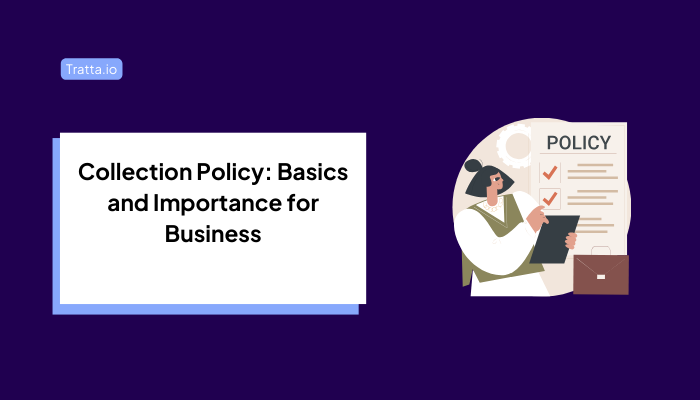
A collection policy sets the rules and steps a collection agency uses to contact consumers, secure payments, and resolve disputes. We understand how costly inconsistent outreach can be, and one missed step may trigger a compliance complaint or backlash from consumers. In March 2025, the CFPB logged over 20,485 debt collection complaints, representing a 16% increase from February.
With consumer debt stress at record highs, a systematic collection policy is essential to protect your agency and sustain trust. In Q1 2025 alone, U.S. debt collection complaints exceeded 112,000, a 150% increase from the previous year, driven by economic strains and more.
Here are some of the essential aspects of an effective debt collection policy:
With Tratta, you can automate many aspects of your collection policy to ensure precision and compliance, reducing manual effort and compliance risks. Tratta’s Omnichannel Communications and Real-time Reporting features allow you to track the success of your collection efforts while ensuring compliance across SMS, email, and voice outreach.
Now, let’s explore some of the important components that are included in the collection policy.
A strong collection policy is crucial for compliance and consumer fairness. With delinquent credit card debt rising by 8.3% in Q1 2025, it's essential to align with federal and state regulations.
This checklist covers the key elements of an effective collection policy that ensures operational integrity and helps you maintain trust while minimizing legal risks.
Define the policy's purpose (e.g., to recover overdue debts efficiently while maintaining customer relations) and set clear goals (e.g., reducing bad debt, ensuring legal compliance).
Outline steps for initial contact, follow-up communications, and escalation procedures, including when to refer debts to third-party agencies or take legal action.
Set standards for respectful and professional communication with debtors, including the frequency, tone, and method of contact.
Ensure adherence to relevant debt collection laws (e.g., FDCPA, GDPR) and maintain confidentiality of debtor information.
Specify acceptable payment methods, terms for payment plans, and conditions for applying late fees or interest on overdue balances.
Detail the process for resolving disputes, including documentation, investigation, and potential mediation steps.
Clarify the circumstances under which debts will be referred to collection agencies or pursued through legal means.
Define the roles of internal staff involved in collections, including training requirements and protocols for managing delinquent accounts.
Establish performance metrics and regular reporting practices to track the success of the collection efforts and identify areas for improvement.
Emphasize fair treatment of debtors, ethical standards in collections, and strategies for maintaining positive customer relationships even during the collection process.
Tratta offers integrated features like Embedded Payment Processing and Consumer Self-Service Portals, allowing you to provide easy, secure payment options while maintaining compliance with your collection policy.
To maintain compliance with changing regulations in the US, it is critical to maintain an updated debt collection policy.
A debt collection policy requires regular updates due to shifting regulatory changes, evolving consumer behavior trends, and changing economic conditions.
Let’s explore some of the challenges a credit collection agency may face without having a proper debt collection policy.
Debt collection calls and consumer complaints have increased significantly in 2025, resulting in a rise in FTC reports regarding collection practices. A whopping 47% of consumers report abusive, harassing, or threatening collection procedures; an effective policy is necessary to safeguard organizations.
Creating a collection policy is only effective when it’s built on proven, well-structured best practices from the start.
Also read: Debt Collection Compliance Checklist: An Essential Guide for Debt Collectors
A systematic collection policy should be practical for daily operations, detailed enough to withstand audits, and flexible enough to accommodate changing regulations. Below are some actionable best practices to develop an effective debt collection policy.
Also read: Automated Debt Collection: Key Strategies and Insights
An up-to-date collection policy is crucial for maintaining compliance, minimising disputes, and ensuring consistent recovery performance in the face of regulatory changes. It is necessary to establish clear communication protocols, refine credit reporting procedures, and address jurisdiction-specific requirements to ensure a collection policy that minimises costly errors.
With Tratta, you can automate compliance safeguards, track consumer consent, enforce contact rules, and keep auditable records within a unified platform. From omnichannel communication controls to real-time analytics, Tratta equips agencies with the tools to operationalise their policy and enhance recovery outcomes without increasing risks.
Book a demo todayThe spike highlights the importance of having a documented, current policy in place to ensure operational effectiveness and reduce risk. In this blog, we will explore how to define and enforce a collection policy that balances compliance and efficiency.
The three stages generally include early-stage reminders, formal collection efforts, and escalation to legal action or third-party involvement. Each stage follows set timelines and compliance requirements.
An example could be a written framework that outlines contact frequency, approved communication channels, and record-keeping standards in line with the FDCPA and Regulation F.
Common steps include account verification, sending a validation notice, adhering to contact frequency limits, resolving disputes, and documenting all actions until resolution or closure.
It’s the operational process your agency follows to apply the policy, covering intake, communications, dispute handling, payment arrangements, and compliance monitoring from start to finish.
Request a validation notice within five days of your initial contact and review it for accuracy. Communicate in writing and keep records to protect your rights.